Abstract
The fate of a cell in a developing organism is a function of its position within the organism. The molecular mechanism that cells use to determine their position and to convert positional information into a form that can be used to regulate the expression of genes is not understood. This paper presents a model in which contacts between complementary molecules on plasma membranes of adjacent cells regulate the concentration of a morphogenetic substance and transmit positional information. This model is described by four equations that, when solved with realistic parameters, demonstrated that this mechanism will produce discrete populations of cells within a few hours from an initially undifferentiated array of cells. The model suggests an explanation for several phenomena that have been observed and suggests experiments to test it and to clearly differentiate it from other models for position determination.
Keywords: differentiation, plasma membrane, Dictyostelium discoideum, cyclic AMP
Full text
PDF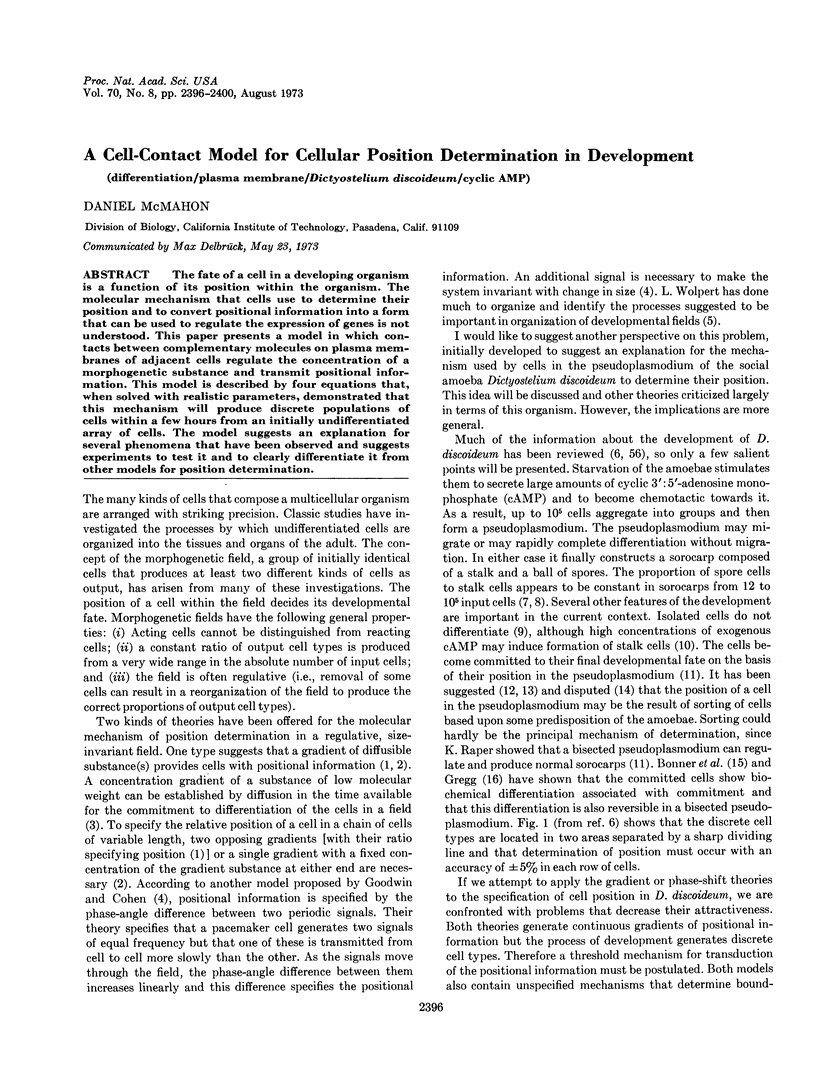
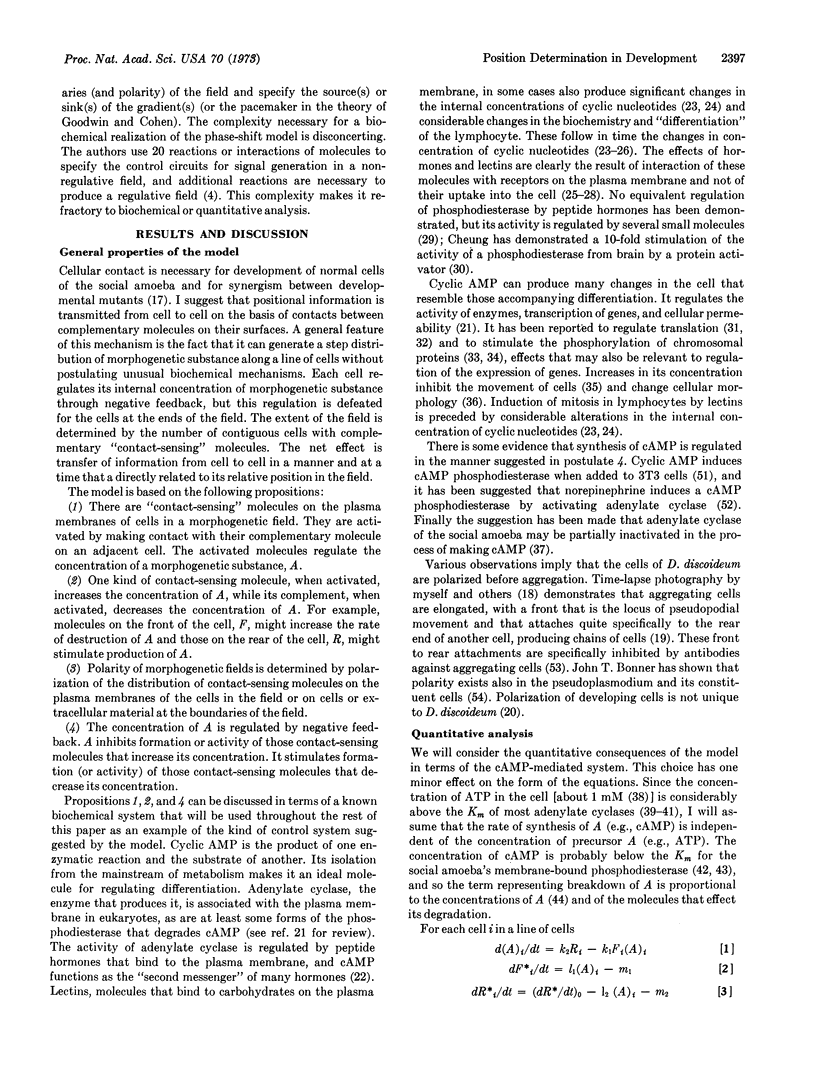
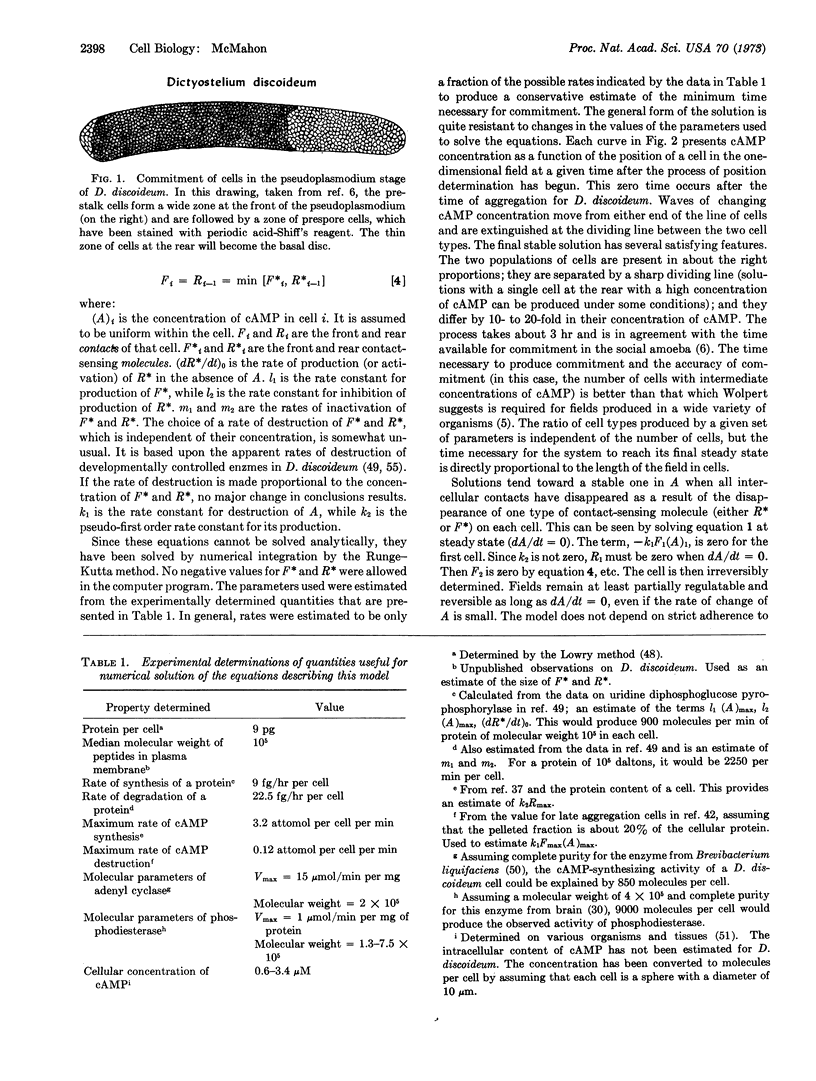
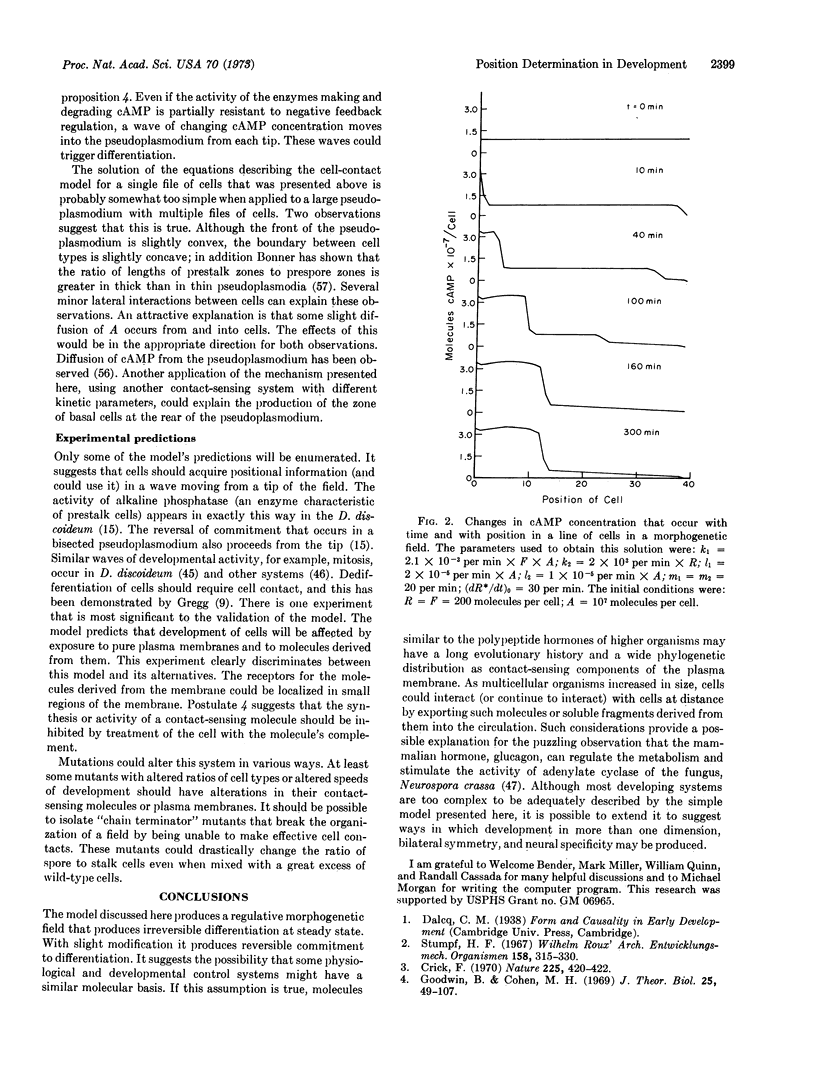
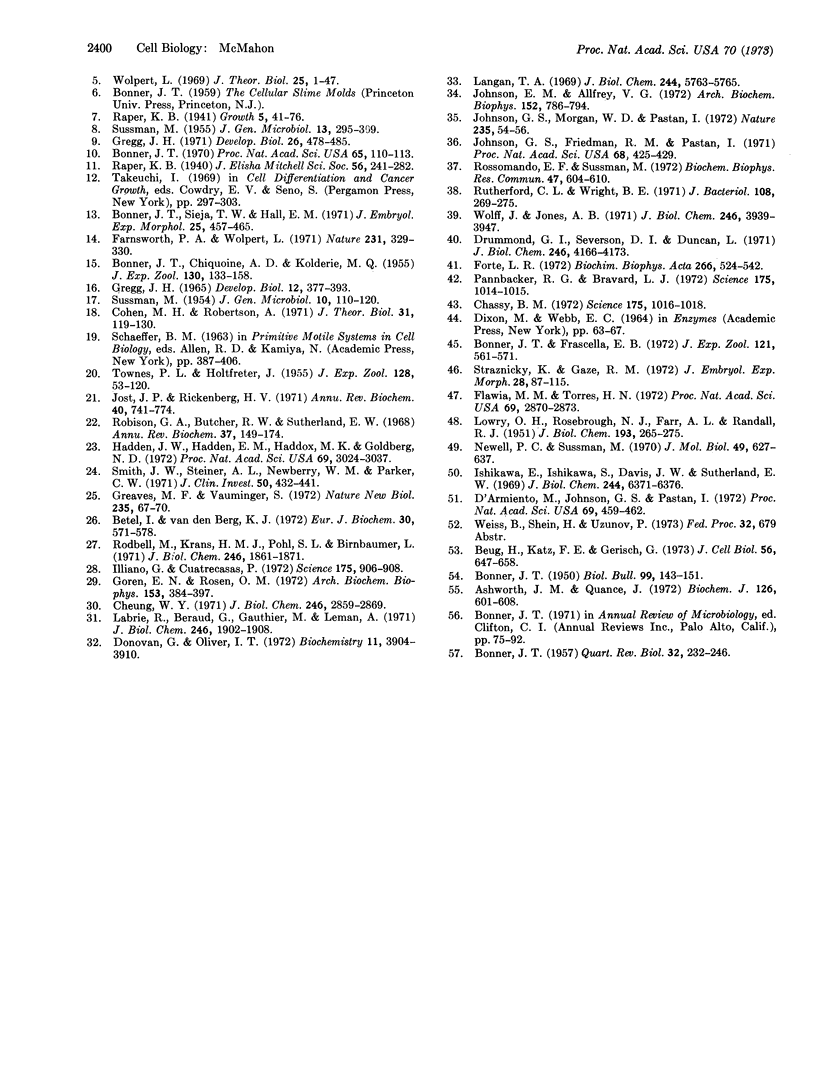
Images in this article
Selected References
These references are in PubMed. This may not be the complete list of references from this article.
- Ashworth J. M., Quance J. Enzyme synthesis in myxamoebae of the cellular slime mould Dictyostelium discoideum during growth in axenic culture. Biochem J. 1972 Feb;126(3):601–608. doi: 10.1042/bj1260601. [DOI] [PMC free article] [PubMed] [Google Scholar]
- BONNER J. T. Observations on polarity in the slime mold Dictyostelium discoideum. Biol Bull. 1950 Oct;99(2):143–151. doi: 10.2307/1538733. [DOI] [PubMed] [Google Scholar]
- Betel I., van den Berg K. J. Interaction of concanavalin A with rat lymphocytes. Eur J Biochem. 1972 Nov 7;30(3):571–578. doi: 10.1111/j.1432-1033.1972.tb02128.x. [DOI] [PubMed] [Google Scholar]
- Beug H., Katz F. E., Gerisch G. Dynamics of antigenic membrane sites relating to cell aggregation in Dictyostelium discoideum. J Cell Biol. 1973 Mar;56(3):647–658. doi: 10.1083/jcb.56.3.647. [DOI] [PMC free article] [PubMed] [Google Scholar]
- Bonner J. T. Induction of stalk cell differentiation by cyclic AMP in the cellular slime mold Dictyostelium discoideum. Proc Natl Acad Sci U S A. 1970 Jan;65(1):110–113. doi: 10.1073/pnas.65.1.110. [DOI] [PMC free article] [PubMed] [Google Scholar]
- Bonner J. T., Sieja T. W., Hall E. M. Further evidence for the sorting out of cells in the differentiation of the cellular slime mold Dictyostelium discoideum. J Embryol Exp Morphol. 1971 Jun;25(3):457–465. [PubMed] [Google Scholar]
- Chassy B. M. Cyclic nucleotide phosphodiesterase in Dictyostelium discoideum: interconversion of two enzyme forms. Science. 1972 Mar 3;175(4025):1016–1018. doi: 10.1126/science.175.4025.1016. [DOI] [PubMed] [Google Scholar]
- Cheung W. Y. Cyclic 3',5'-nucleotide phosphodiesterase. Evidence for and properties of a protein activator. J Biol Chem. 1971 May 10;246(9):2859–2869. [PubMed] [Google Scholar]
- Cohen M. H., Robertson A. Chemotaxis and the early stages of aggregation in cellular slime molds. J Theor Biol. 1971 Apr;31(1):119–130. doi: 10.1016/0022-5193(71)90125-1. [DOI] [PubMed] [Google Scholar]
- Crick F. Diffusion in embryogenesis. Nature. 1970 Jan 31;225(5231):420–422. doi: 10.1038/225420a0. [DOI] [PubMed] [Google Scholar]
- D'Armiento M., Johnson G. S., Pastan I. Regulation of adenosine 3',5'-cyclic monophosphate phosphodiesterase activity in fibroblasts by intracellular concentrations of cyclic adenosine monophosphate (3T3-dibutyryl cyclic AMP-SV40-transformed cells-michaelis constants-L cells-prostaglandin E 1 ). Proc Natl Acad Sci U S A. 1972 Feb;69(2):459–462. doi: 10.1073/pnas.69.2.459. [DOI] [PMC free article] [PubMed] [Google Scholar]
- Donovan G., Oliver I. T. Purification and properties of a microsomal cyclic adenosine monophosphate binding protein required for the release of tyrosine aminotransferase from polysomes. Biochemistry. 1972 Oct 10;11(21):3904–3910. doi: 10.1021/bi00771a011. [DOI] [PubMed] [Google Scholar]
- Drummond G. I., Severson D. L., Duncan L. Adenyl cyclase. Kinetic properties and nature of fluoride and hormone stimulation. J Biol Chem. 1971 Jul 10;246(13):4166–4173. [PubMed] [Google Scholar]
- Farnsworth P. A., Wolpert L. Absence of cell sorting out in the grex of the slime mould Dictyostelium discoideum. Nature. 1971 Jun 4;231(5301):329–330. doi: 10.1038/231329a0. [DOI] [PubMed] [Google Scholar]
- Flawiá M. M., Torres H. N. Activation of membrane-bound adenylate cyclase by glucagon in Neurospora crassa. Proc Natl Acad Sci U S A. 1972 Oct;69(10):2870–2873. doi: 10.1073/pnas.69.10.2870. [DOI] [PMC free article] [PubMed] [Google Scholar]
- Forte L. R. Characterization of the adenyl cyclase of rat kidney plasma membranes. Biochim Biophys Acta. 1972 May 9;266(2):524–542. doi: 10.1016/0005-2736(72)90108-3. [DOI] [PubMed] [Google Scholar]
- Goodwin B. C., Cohen M. H. A phase-shift model for the spatial and temporal organization of developing systems. J Theor Biol. 1969 Oct;25(1):49–107. doi: 10.1016/s0022-5193(69)80017-2. [DOI] [PubMed] [Google Scholar]
- Goren E. N., Rosen O. M. Purification and properties of a cyclic nucleotide phosphodiesterase from bovine heart. Arch Biochem Biophys. 1972 Nov;153(1):384–397. doi: 10.1016/0003-9861(72)90459-6. [DOI] [PubMed] [Google Scholar]
- Greaves M. F., Bauminger S. Activation of T and B lymphocytes by insoluble phytomitogens. Nat New Biol. 1972 Jan 19;235(55):67–70. doi: 10.1038/newbio235067a0. [DOI] [PubMed] [Google Scholar]
- Gregg J. H. Developmental potential of isolated Dictyostelium myxamoebae. Dev Biol. 1971 Nov;26(3):478–485. doi: 10.1016/0012-1606(71)90077-7. [DOI] [PubMed] [Google Scholar]
- Gregg J. H. Regulation in the cellular slime molds. Dev Biol. 1965 Dec;12(3):377–393. doi: 10.1016/0012-1606(65)90004-7. [DOI] [PubMed] [Google Scholar]
- Hadden J. W., Hadden E. M., Haddox M. K., Goldberg N. D. Guanosine 3':5'-cyclic monophosphate: a possible intracellular mediator of mitogenic influences in lymphocytes. Proc Natl Acad Sci U S A. 1972 Oct;69(10):3024–3027. doi: 10.1073/pnas.69.10.3024. [DOI] [PMC free article] [PubMed] [Google Scholar]
- Illiano G., Cuatrecasas P. Modulation of adenylate cyclase activity in liver and fat cell membranes by insulin. Science. 1972 Feb 25;175(4024):906–908. doi: 10.1126/science.175.4024.906. [DOI] [PubMed] [Google Scholar]
- Ishikawa E., Ishikawa S., Davis J. W., Sutherland E. W. Determination of guanosine 3',5'-monophosphate in tissues and of guanyl cyclase in rat intestine. J Biol Chem. 1969 Dec 10;244(23):6371–6376. [PubMed] [Google Scholar]
- Johnson E. M., Allfrey V. G. Differential effects of cyclic adenosine-3',5'-monophosphate on phosphorylation of rat liver nuclear acidic proteins. Arch Biochem Biophys. 1972 Oct;152(2):786–794. doi: 10.1016/0003-9861(72)90274-3. [DOI] [PubMed] [Google Scholar]
- Johnson G. S., Friedman R. M., Pastan I. Restoration of several morphological characteristics of normal fibroblasts in sarcoma cells treated with adenosine-3':5'-cyclic monphosphate and its derivatives. Proc Natl Acad Sci U S A. 1971 Feb;68(2):425–429. doi: 10.1073/pnas.68.2.425. [DOI] [PMC free article] [PubMed] [Google Scholar]
- Johnson G. S., Morgan W. D., Pastan I. Regulation of cell motility by cyclic AMP. Nature. 1972 Jan 7;235(5332):54–56. doi: 10.1038/235054a0. [DOI] [PubMed] [Google Scholar]
- LOWRY O. H., ROSEBROUGH N. J., FARR A. L., RANDALL R. J. Protein measurement with the Folin phenol reagent. J Biol Chem. 1951 Nov;193(1):265–275. [PubMed] [Google Scholar]
- Labrie F., Béraud G., Gauthier M., Lemay A. Actinomycin-insensitive stimulation of protein synthesis in rat anterior pituitary in vitro by dibutyryl adenosine 3',5'-monophosphate. J Biol Chem. 1971 Mar 25;246(6):1902–1908. [PubMed] [Google Scholar]
- Langan T. A. Action of adenosine 3',5'-monophosphate-dependent histone kinase in vivo. J Biol Chem. 1969 Oct 25;244(20):5763–5765. [PubMed] [Google Scholar]
- Newell P. C., Sussman M. Regulation of enzyme synthesis by slime mold cell assemblies embarked upon alternative developmental programs. J Mol Biol. 1970 May 14;49(3):627–637. doi: 10.1016/0022-2836(70)90287-1. [DOI] [PubMed] [Google Scholar]
- Pannbacker R. G., Bravard L. J. Phosphodiesterase in Dictyostelium discoideum and the chemotactic response to cyclic adenosine monophosphate. Science. 1972 Mar 3;175(4025):1014–1015. doi: 10.1126/science.175.4025.1014. [DOI] [PubMed] [Google Scholar]
- Robison G. A., Butcher R. W., Sutherland E. W. Cyclic AMP. Annu Rev Biochem. 1968;37:149–174. doi: 10.1146/annurev.bi.37.070168.001053. [DOI] [PubMed] [Google Scholar]
- Rodbell M., Krans H. M., Pohl S. L., Birnbaumer L. The glucagon-sensitive adenyl cyclase system in plasma membranes of rat liver. 3. Binding of glucagon: method of assay and specificity. J Biol Chem. 1971 Mar 25;246(6):1861–1871. [PubMed] [Google Scholar]
- Rossomando E. F., Sussman M. Adenyl cyclase in Dictyostelium discoideum: a possible control element of the chemotactic system. Biochem Biophys Res Commun. 1972 May 12;47(3):604–610. doi: 10.1016/0006-291x(72)90921-7. [DOI] [PubMed] [Google Scholar]
- Rutherford C. L., Wright B. E. Nucleotide metabolism during differentiation in Dictyostelium discoideum. J Bacteriol. 1971 Oct;108(1):269–275. doi: 10.1128/jb.108.1.269-275.1971. [DOI] [PMC free article] [PubMed] [Google Scholar]
- SUSSMAN M. Fruity and other mutants of the cellular slime mould, Dictyostelium discoideum: a study of developmental aberrations. J Gen Microbiol. 1955 Oct;13(2):295–309. doi: 10.1099/00221287-13-2-295. [DOI] [PubMed] [Google Scholar]
- SUSSMAN M. Synergistic and antagonistic interactions between morphogenetically deficient variants of the slime mould Dictyostelium discoideum. J Gen Microbiol. 1954 Feb;10(1):110–120. doi: 10.1099/00221287-10-1-110. [DOI] [PubMed] [Google Scholar]
- Smith J. W., Steiner A. L., Newberry W. M., Jr, Parker C. W. Cyclic adenosine 3',5'-monophosphate in human lymphocytes. Alterations after phytohemagglutinin stimulation. J Clin Invest. 1971 Feb;50(2):432–441. doi: 10.1172/JCI106510. [DOI] [PMC free article] [PubMed] [Google Scholar]
- Straznicky K., Gaze R. M. The development of the tectum in Xenopus laevis: an autoradiographic study. J Embryol Exp Morphol. 1972 Aug;28(1):87–115. [PubMed] [Google Scholar]
- Wolff J., Jones A. B. The purification of bovine thyroid plasma membranes and the properties of membrane-bound adenyl cyclase. J Biol Chem. 1971 Jun 25;246(12):3939–3947. [PubMed] [Google Scholar]
- Wolpert L. Positional information and the spatial pattern of cellular differentiation. J Theor Biol. 1969 Oct;25(1):1–47. doi: 10.1016/s0022-5193(69)80016-0. [DOI] [PubMed] [Google Scholar]



